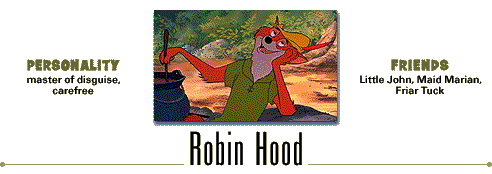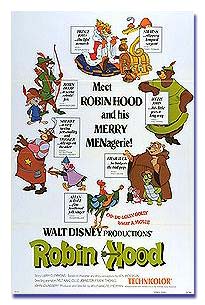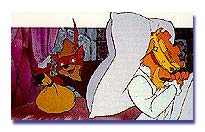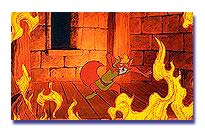 |
 |
 |
 he life of this hero (or outlaw, depending on your
point of view) is one of adventure and excitement. Robin's a foxy
master of disguise who uses his wiles to help the poor, overtaxed
people of Nottingham. "Steal from the rich and give to the poor" is
his motto. But Robin doesn't think of it as stealing. Along with
his sidekick, Little John, he considers it only "borrowing" from
those who can afford it. His favorite target is greedy Prince John,
and he manages to "borrow" the very rings from the usurper's
fingers. Even though such audacity reserves him a place at the
hangman's gallows, Robin's not worried. He doesn't do it just for
the adventure, but for Nottingham. The welfare of the people is
more important to him than his own neck. he life of this hero (or outlaw, depending on your
point of view) is one of adventure and excitement. Robin's a foxy
master of disguise who uses his wiles to help the poor, overtaxed
people of Nottingham. "Steal from the rich and give to the poor" is
his motto. But Robin doesn't think of it as stealing. Along with
his sidekick, Little John, he considers it only "borrowing" from
those who can afford it. His favorite target is greedy Prince John,
and he manages to "borrow" the very rings from the usurper's
fingers. Even though such audacity reserves him a place at the
hangman's gallows, Robin's not worried. He doesn't do it just for
the adventure, but for Nottingham. The welfare of the people is
more important to him than his own neck. |
|
 |

Disney had been looking to do an all-animal animated feature based
on "Robin Hood" since the early 1930s. Initially they had been
considering the 12th century "Reynard the Fox" stories, but Walt
was concerned that Reynard was basically a "crook" and wouldn't
provide an appropriate hero. Ken Anderson, however, kept the
approach alive and eventually applied some elements to Disney's
"Robin Hood." |
|
 |

The studio already had one version of this classic under their
belt; a lavish Technicolor® film, "The Story of Robin Hood and
His Merrie Men," was produced in England by Walt Disney in 1954.
Starring Richard Todd as the daring bandit, this adaptation told a
more detailed and dramatic story than the animated version, but
clearly served as its narrative inspiration.
Film: "Robin Hood " (1974)
Voice Artist: Brian Bedford |
|
 |
 |
 |
|
|
 |
 |
 |
|
|
 |
|
 |